Hillary Clinton Recommends... Find a Way


Jennifer Enderlin has been promoted to executive v-p and publisher of St. Martin's Press, effective immediately. Enderlin continues in her role as an editor.
"Jen's qualifications are outstanding," said Sally Richardson, president and publisher of St. Martin's. "Her editorial expertise is legendary, and the breadth and depth of her instincts and ability in all things publishing, from the planning, acquisition, and then execution throughout all aspects of the entire process, is unparalleled."
Don Weisberg, president of Macmillan Publishers U.S., commented: "I have known and admired Sally Richardson and Jen Enderlin from afar and now having the opportunity to work closely with them, I am so impressed by their passion and enthusiasm for their people and their knowledge of the books and rich publishing history at St. Martin's. I cannot imagine the publishing program at St. Martin's Press being in better hands."
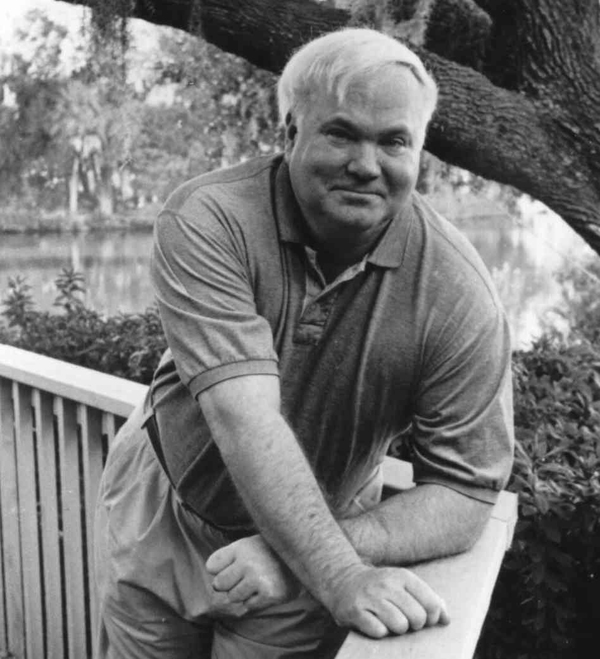 The Pat Conroy Literary Center will open this fall in Beaufort, S.C., where the beloved and bestselling author lived. The goal of the facility, which is located in a historic building, is to "create a welcoming gathering place for events, workshops, and classes to nurture and inspire writers and readers, young and old."
The Pat Conroy Literary Center will open this fall in Beaufort, S.C., where the beloved and bestselling author lived. The goal of the facility, which is located in a historic building, is to "create a welcoming gathering place for events, workshops, and classes to nurture and inspire writers and readers, young and old."
The board of directors is chaired by Conroy's widow Cassandra King, with Marly Rusoff serving as director/honorary chair. The honorary board includes Nan A. Talese, Jonathan Galassi, John Grisham and Barbra Streisand.
The center's home page notes that Conroy, "who helped so many writers, died on March 4, 2016. He was not able to continue his generous attempts to repay. the debt he felt he owed to his readers and all those who helped him along his way. We hope you will join us in continuing his legacy of generosity." Donations to the Pat Conroy Literary Center can be made here.
 |
|
| Andy Cohen | |
Henry Holt is launching Andy Cohen Books, an imprint designed to showcase Cohen's "unique ability to discover compelling personal narratives" as a Bravo TV network producer and executive, host of Watch What Happens Live, and curator of his own Sirius XM channel, Radio Andy. The inaugural list of titles for Andy Cohen Books has yet to be announced.
As a bestselling author, his titles include Most Talkative: Stories from the Frontlines of Pop Culture and The Andy Cohen Diaries: A Deep Look at a Shallow Year. This fall, Holt will publish a sequel, Superficial: More Adventures from the Andy Cohen Diaries.
"My not-so secret passion is writing, and through my wonderful partnership with Holt, I've become obsessed with the business of publishing," said Cohen. "I'm already developing shows for radio and TV, and now can't wait to develop bestselling books written by many of the people I know who are primed to hit it out of the park."
Holt editor-in-chief Gillian Blake added: "At the heart of Andy Cohen's many remarkable talents, there is a pure genius for tapping into what people are craving in today's marketplace. Books are a natural next direction for Andy, who has brought tremendous media savvy to the publication of his own books at Holt. He is an ideal partner."

"BookCon @ NYCC is a testament to the continued success of New York Comic Con as the Show grows beyond the Javits Center," said Lance Fensterman, global senior v-p of ReedPOP. "It's a privilege to connect leading publishers and authors with throngs of NYCC fans and to unite two great New York City events for our fans to experience."
 Turner Publishing has acquired Jewish Lights Publishing, which was founded in 1990 by Stuart and Antoinette Matlins. Forward reported that "the small press, which grew out of a congregation the duo founded in Woodstock, Vt., and produces 40 to 50 books a year, has helped shape conversations about Judaism between Jews and non-Jews alike." The deal includes three other imprints Matlins established under his holding company, LongHill Partners Inc.
Turner Publishing has acquired Jewish Lights Publishing, which was founded in 1990 by Stuart and Antoinette Matlins. Forward reported that "the small press, which grew out of a congregation the duo founded in Woodstock, Vt., and produces 40 to 50 books a year, has helped shape conversations about Judaism between Jews and non-Jews alike." The deal includes three other imprints Matlins established under his holding company, LongHill Partners Inc.
Matlins said the decision to sell was based on an evaluation of the press's needs in a struggling market: "When I started Jewish Lights, my job was to get books into bookstores, because that was the only place they were available. In order to reach the bookstore audience, we now [need] to be part of a larger organization with a stronger bookstore sales force and a stronger gift shop sales force, and Turner offers that to us."
Joe Shuman, "a bookseller who turned Trover Shop into a fixture on Capitol Hill, stocking the shelves of neighborhood homes, congressional offices and Library of Congress reading rooms for half a century," died June 6, the Washington Post reported. He was 88. The life of the bookstore, which closed in 2009, spanned 26 Congresses--the 85th through the 110th--and served as "a gathering place for political junkies of all persuasions."
Shuman and his friend Harvey Weinstein purchased Trover Shop in 1958, and "operated the bookstore with their wives at its original Independence Avenue address in Southeast Washington until the location was selected as the site of the Library of Congress's Madison building," the Post wrote. In the mid-1960s, the bookstore moved to the 200 block of Pennsylvania Avenue SE, where Shuman continued to run it after his business partner died.
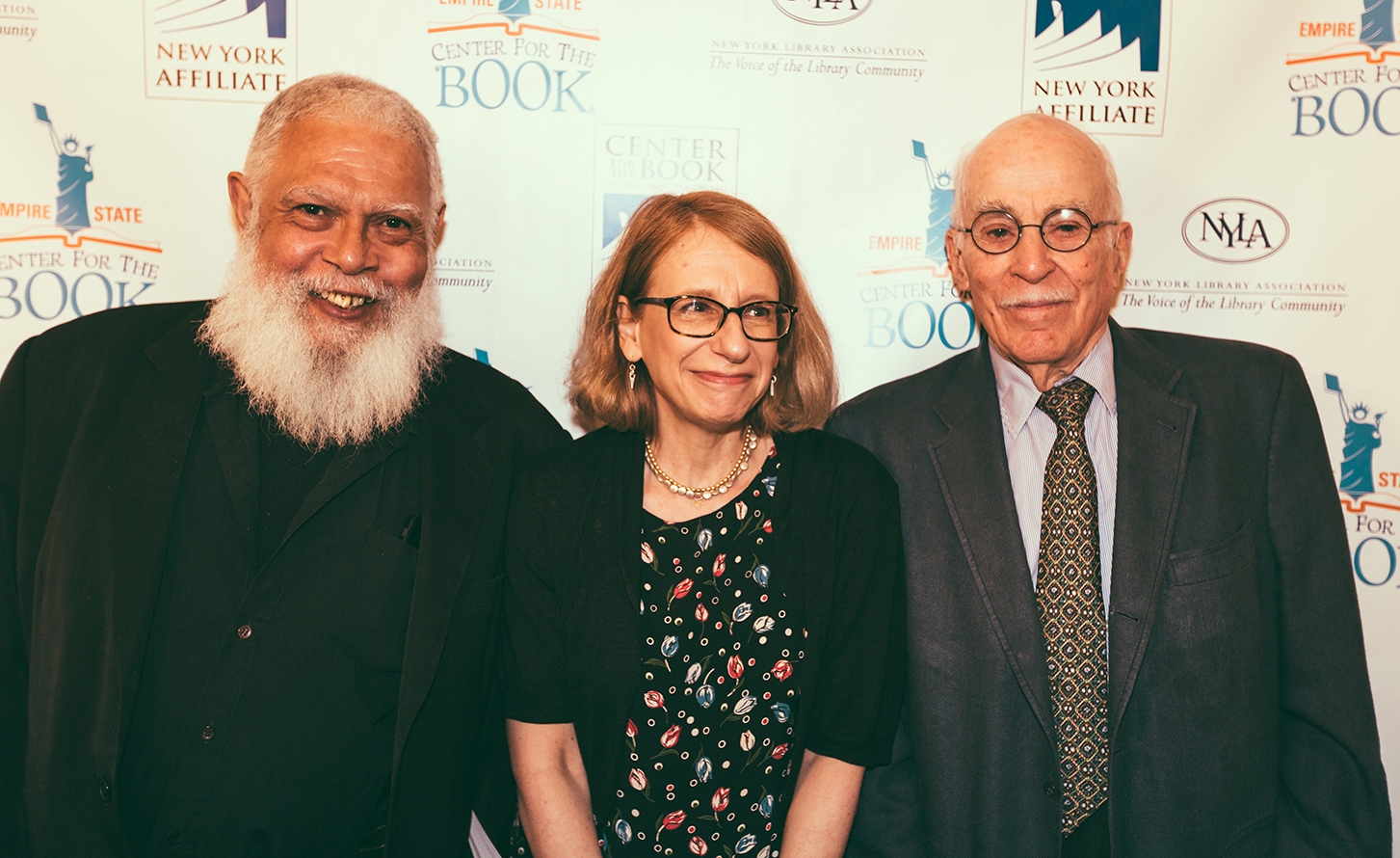 For the seventh year, the Empire State Center for the Book inducted a group of diverse writers into the New York State Writers Hall of Fame. Honorees Samuel R. Delany, Roz Chast and Roger Angell (pictured, l.-r.) attended the June 7 event at New York City's 3 West Club, where Maya Angelou, Jean Craighead George, Grace Paley and Don Marquis were recognized posthumously. Stephen Sondheim was not able to attend due to illness. In his acceptance remarks, science fiction writer Delany told of his fondness of fellow inductee Don Marquis's famed characters Archy and Mehitabel.
For the seventh year, the Empire State Center for the Book inducted a group of diverse writers into the New York State Writers Hall of Fame. Honorees Samuel R. Delany, Roz Chast and Roger Angell (pictured, l.-r.) attended the June 7 event at New York City's 3 West Club, where Maya Angelou, Jean Craighead George, Grace Paley and Don Marquis were recognized posthumously. Stephen Sondheim was not able to attend due to illness. In his acceptance remarks, science fiction writer Delany told of his fondness of fellow inductee Don Marquis's famed characters Archy and Mehitabel.
The NYS Writers Hall of Fame was established in conjunction with the Empire State Center for the Book to highlight the rich literary heritage of New York State and to recognize the legacy of individual New York State writers.
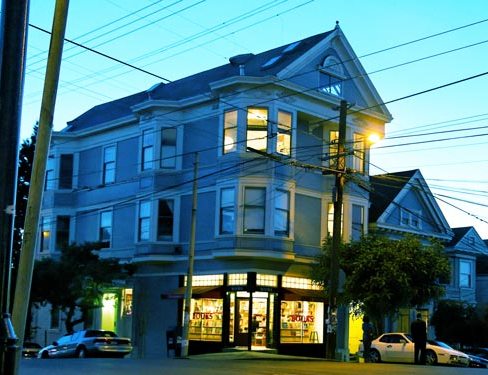 Congratulations to Christopher's Books, San Francisco, Calif., which will celebrate its 25th anniversary next month, Hoodline reported.
Congratulations to Christopher's Books, San Francisco, Calif., which will celebrate its 25th anniversary next month, Hoodline reported.
"It's really a community space that happens to be a bookstore," said owner Tee Minot, who began working there a year after Christopher Ellison founded it in 1992, and has been the sole proprietor since 1996. Although he no longer has a stake in the business, Ellison still picks up a few shifts a month, and Minot said he is "one of the nicest guys you'll ever meet, and you can talk to him about anything."
Staff member Lael Robertson noted that the store "has a great atmosphere. Most of the time we're having a lot of fun while we are working."
"Kids grow up in the store," Minot added. "A lot of times, it's the first place they're allowed to walk to alone, and it's where they try to get their first job. It's an extension of my home... if I could put couches in here, I would." She recalled that in the beginning, "I kept trying to figure out how I could compete with Amazon. However, I realized that I didn't want to be a chain, but a small, well-curated space where people could have a face-to-face relationship to their bookseller."
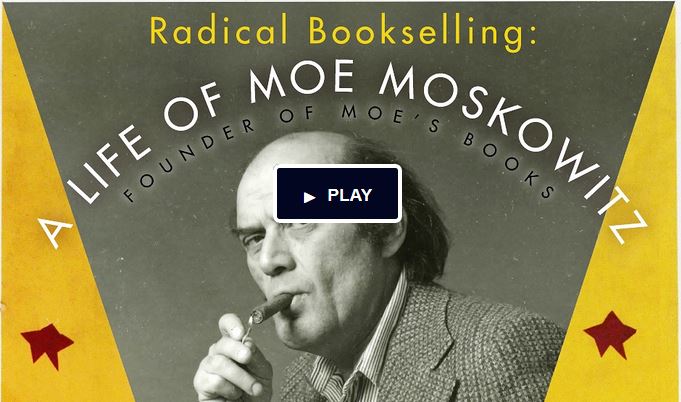
The book, designed by Grégoire Vion, will "detail Moskowitz's life, and how he came to open a bookstore in 1959 (the precursor to the current store). It will be image-rich, with photos of what happened on Telegraph Avenue during the fight to stop the war and to create People's Park; as well as posters of happenings at the store and around town. The book also recounts Moskowitz's battle with Berkeley to retain the right to smoke his cigar in the store," Berkeleyside wrote.

Sunday:
PBS's The Open Mind: Virginia Heffernan, author of Magic and Loss: The Internet as Art (Simon & Schuster, $26, 9781439191705).
AMC is developing a six-part miniseries based on David Carr's memoir The Night of the Gun: A Reporter Investigates the Darkest Story of His Life. His Own. Bob Odenkirk (Breaking Bad, Better Call Saul) will star as "the acclaimed New York Times journalist who died last year," with Shawn Ryan (The Shield, Terriers) writing, Indiewire reported.
"David Carr's work as a journalist was uncompromising, enlightening, and most of all, always driven by a fundamental quest for the truth," said Joe Stillerman of AMC and SundanceTV. "When he turned those skills and values around to focus on his own life as an addict, the result was a stunningly original, compelling and important piece of journalism the likes of which the world had never seen--a simultaneously heartbreaking, funny, and inspirational account that redefined the idea of telling a personal story."
---
Hettie Macdonald (Fortitude) will direct the BBC's miniseries adaptation of Howards End, based on the classic E.M. Forster novel that was also an Oscar-winning Merchant Ivory film in 1992, Deadline reported. Kenneth Lonergan (You Can Count on Me, Gangs of New York) is writing the series.
Akhil Sharma's Family Life won the €100,000 (about $113,215) International Dublin Literary Award, which "aims to promote excellence in world literature" by honoring a novel written in English or translated into English.
"Suffering and the struggle to ameliorate suffering are not unknown in fiction but Family Life pulls off the extraordinary feat of showing them in their correct alignment," the judges said. "Closing the book, having known this mix of light and dark, you are left with the sense that while reading you were actually at the core of human experience and what it is to be alive. This is the highest form of achievement in literature. Few manage it. This novel does. Triumphantly. Luminously. Movingly."
The Guardian noted that the prize is "unusual in that contenders... are nominated by public libraries from around the world, with Family Life put forward by the India International Centre library in New Delhi and by Jacksonville Public Library in the U.S."
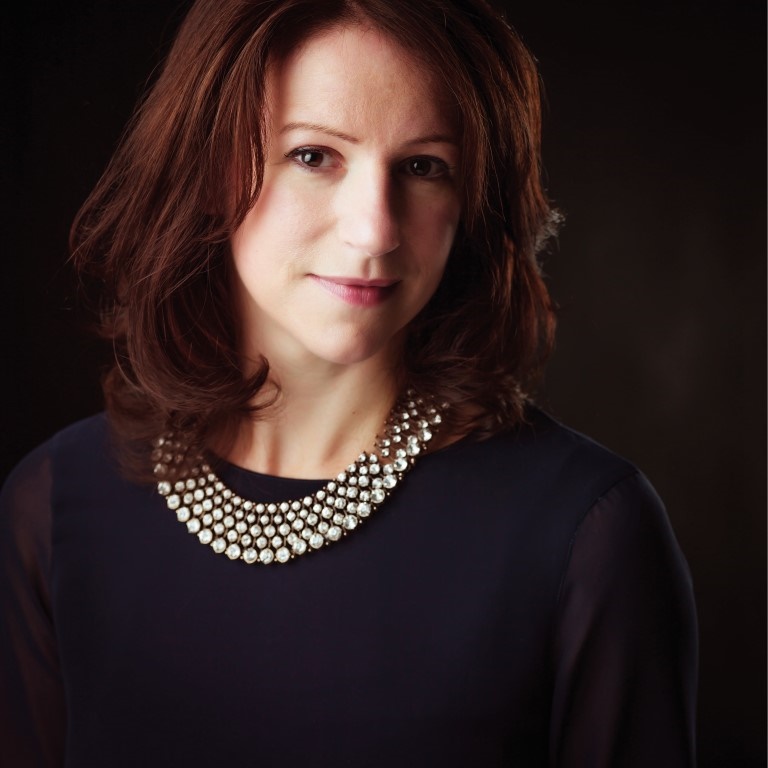 |
|
| photo: Deasy Photographic | |
Hazel Gaynor is the author of A Memory of Violets and The Girl Who Came Home, for which she received the 2015 RNA Historical Novel of the Year award. She was the recipient of the 2012 Cecil Day Lewis Award for Emerging Writers and was selected by Library Journal as one of Ten Big Breakout Authors for 2015. Originally from Yorkshire, England, Gaynor now lives in Ireland with her husband and two children. The Girl from the Savoy (Morrow, June 7, 2016) is her third novel.
On your nightstand now:
The Trouble with Goats and Sheep by Joanna Cannon. Part whodunnit, part coming of age, this is a wonderful book and is taking me right back to my childhood in 1970s England. Loving it.
Favorite book when you were a child:
The House at Pooh Corner by A.A. Milne. I truly believe that Pooh, Piglet, Tigger and Eeyore are all alive and well in the Hundred Acre Wood, and refuse to believe anyone who tells me otherwise.
Your top five authors:
Philippa Gregory, Rose Tremain, Jane Austen, Daphne du Maurier and Michael Morpurgo (I read a lot of his books with my kids and they are astonishingly good).
Book you've faked reading:
I've never faked reading a book, but I have tried, and failed (several times) to read One Hundred Years of Solitude by Gabriel García Márquez. It still sits on the shelf in hope.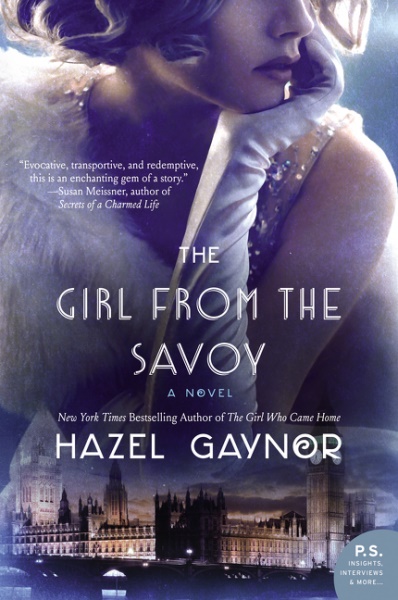 Book you're an evangelist for:
Book you're an evangelist for:
The Guernsey Literary and Potato Peel Pie Society by Mary Ann Shaffer and Annie Barrows. The title alone is worth being evangelical about! This beautiful little epistolary novel is set on the island of Guernsey in the aftermath of World War II. Full of wonderful characters, wit, warmth and ultimately heartbreaking. I could go on.
Book you've bought for the cover:
I didn't buy it for the cover because I was buying it anyway, but The Miniaturist by Jessie Burton has a beautiful cover. The inside more than lives up to it.
Book you hid from your parents:
Lace by Shirley Conran. I read this as a teenager (no idea where I got hold of it). Fifty Shades was but a twinkle in E.L. James's eye back then!
Book that changed your life:
I'm not sure it changed my life (my kids did that), but Emily Brontë's Wuthering Heights certainly had a profound impact on me. I read it as a teenager, and it was the first piece of classic English literature I'd read for pleasure, rather than because it was on the school syllabus. I grew up in Yorkshire, not too far from Haworth, and the moors where the Brontës lived so I suppose part of me understood the landscape. I've re-read it many times since.
Favorite line from a book:
"Reader, I married him," from Charlotte Brontë's Jane Eyre.
Five books you'll never part with:
A signed copy of The Last Letter from Your Lover by Jojo Moyes, a signed copy of The Other Boleyn Girl by Philippa Gregory, Pride & Prejudice (scribbled in the margins from its time as my English Literature textbook), The House at Pooh Corner (see above) and Jonathan Livingston Seagull by Richard Harris, for its quiet brilliance.
Book you most want to read again for the first time:
Charlotte Brontë's Jane Eyre.
Book with the most memorable character:
Robert Merivel from the novels Restoration and Merivel by Rose Tremain. Merivel is a 17th-century English physician who works his way into the court of King Charles II. He is such a brilliant character. I often think about him and his badger-fur tabard (you'd have to read the book!)
Seinfeldia: How a Show About Nothing Changed Everything by Jennifer Keishin Armstrong (Simon & Schuster, $26 hardcover, 9781476756103, July 5, 2016)
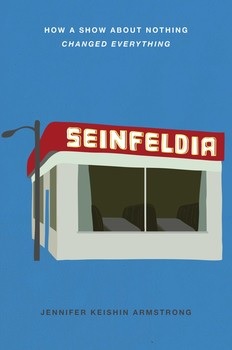 Former Entertainment Weekly writer Jennifer Keishin Armstrong follows her 2013 history of the beloved sitcom The Mary Tyler Moore Show (Mary and Lou and Rhoda and Ted) with a breezy and entertaining portrait of Seinfeld. The iconic show defined television comedy in the 1990s and beyond, and became an enduring and influential cultural touchstone.
Former Entertainment Weekly writer Jennifer Keishin Armstrong follows her 2013 history of the beloved sitcom The Mary Tyler Moore Show (Mary and Lou and Rhoda and Ted) with a breezy and entertaining portrait of Seinfeld. The iconic show defined television comedy in the 1990s and beyond, and became an enduring and influential cultural touchstone.
Armstrong's "Seinfeldia" is a "special dimension of existence, somewhere between the show itself and real life," a place where the show's "characters, settings, jokes, and catchphrases continue to intrude on our daily reality twenty years later." Much of that durability, she suggests, flows from the porous boundaries of the typically trivial daily irritations Larry David, Jerry Seinfeld and their writers used as fodder for the show's comedy. Not to mention the 180 episodes of highly polished comedy they produced. Armstrong relies heavily on interviews with Seinfeld's writers--David and the show's stars did not participate--and those conversations reveal how remarkable it was that Seinfeld maintained such a high standard of originality and quality when the writing staff turned over almost annually.
The story of Seinfeld's shaky debut is well known. A failed pilot in 1989, followed by four episodes in the desert of summer television in 1990, didn't yield a full season order until the fall of 1991. It was not until the show moved to Thursday night, in 1992, that Seinfeld hit its stride. By 1996, it was contributing $200 million to NBC's bottom line. Despite winning only one Emmy for Outstanding Comedy Series, Armstrong explains, Seinfeld pioneered techniques that included "on-location shoots, quick cuts, and a boundless sense of where plots could go." Its distinctive combination of intelligence and attitude set a standard for the generation of sitcoms that would follow. In December 1997, when Jerry Seinfeld turned down the personal plea of General Electric chairman and CEO Jack Welch to renew the show for a 10th season (in the process rejecting an offer of $5 million per episode for his services), he recognized that any other answer risked tarnishing this singular achievement.
Readers looking for scandal, intrigue or score settling won't find it in Seinfeldia. Armstrong's admiring account clearly is aimed at the show's vast fan base, old and new, that continues to revel in its "detached, sardonic outlook" as they fuel a syndicated afterlife that's generated $3 billion in revenue since the controversial 1998 network finale. Not bad for a sitcom that started with nothing more than, as Jerry Seinfeld once put it, "Two guys talking." --Harvey Freedenberg, attorney and freelance reviewer
Shelf Talker: Jennifer Keishin Armstrong delivers an admiring peek behind the scenes of one of television's iconic shows.
Piped water, piped electricity, piped gas--but never piped music! --Stephen Fry
I'm taking a quick international poll: If you are reading this column in a bookstore, tell me what kind of music is playing on the shop's sound system?
Generally speaking, what do you think of "piped music" in bookstores? I only ask because music seems to be on my mind this week, thanks to the impending Tony Awards Sunday (even though the only Broadway musical I've seen in recent years is Fun Home) and Neil Gaiman's The View from the Cheap Seats playlist, showcased recently on the Powell's Books blog.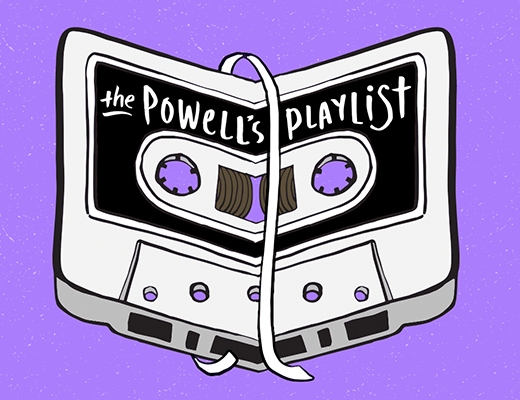
More to the point, I also read that Waterstones "has been quietly pressing the mute button in its shops to give their customers some peace as they browse its shelves." The U.K. bookstore chain, which "joined the growing backlash against piped music," said more than three quarters of its almost 300 shops have imposed a ban on music in recent years, with CEO James Daunt noting that most customers want peace and quiet while visiting a bookshop, the Daily Mail reported.
The movement against piped music also gained momentum recently when British mega-retailer Marks & Spencer (M&S) announced its decision to "switch off background music in stores in response to feedback from customers and staff."
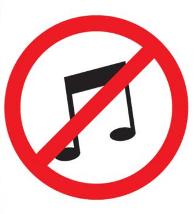 Tumbling down this virtual rabbit hole, I learned that an organization called Pipedown, which was founded two decades ago by Nigel Rodgers, counts Philip Pullman, Joanna Lumley and the aforementioned Stephen Fry among its supporters. Recently, Rodgers visited the M&S flagship Marble Arch store in London, where he told the Guardian he heard "nothing. When noise is succeeded by silence, there is a sense of release."
Tumbling down this virtual rabbit hole, I learned that an organization called Pipedown, which was founded two decades ago by Nigel Rodgers, counts Philip Pullman, Joanna Lumley and the aforementioned Stephen Fry among its supporters. Recently, Rodgers visited the M&S flagship Marble Arch store in London, where he told the Guardian he heard "nothing. When noise is succeeded by silence, there is a sense of release."
Last December, when Waterstones CEO James Daunt first announced that the company would begin turning down the in-store volume, Rodgers advised Pipedown members "to persist with their quiet policy, congratulate the staff in each quiet branch and hand over a blue card saying 'Thank you for not having music.' (Available free to members for an SAE.) Better still, write to James Daunt himself to urge him to continue his no-muzac policy and to congratulate him on revitalizing Waterstones."
And yet...
More than half my work life was spent in music-infused retail environments, beginning with a supermarket job in the 1970s. To this day, I retain a distinct, spine-tingling memory of the butcher's band saw whining in counterpoint to Muzak. This is perhaps one reason why '60s flower children like myself remain a little bewildered. How could we psychologically process a catatonic string arrangement of "The Age of Aquarius," accompanied by steel cutting through flesh and bone?
Time moved on. By the 1990s, when I became a bookseller, there were logical retail grounds for inflicting piped music on bookstore customers in the form of increased CD sales. Playing a select rotation of CDs--soft jazz or classical or folk, minimal words--not only fostered a certain aural calm, it also consistently sparked patron's interest, despite moments of confusion:
Customer: "What's that playing? Do you have the CD in stock?"
Me (listening closely for the first time in hours, having instinctively learned how to not hear the endless music loop): "That? It's... Let me check. (quick glance at CD cases by stereo) It's George Winston's Forest."
Customer: "I think it's beautiful. Don't you?"
Me: "Um, sure... Let me show you where to find it."
(Customer follows, whistling an unrecognizable tune in the spirit of George Winston.)
Holiday season piped music. I guess I have to mention that. We sold buckets of those CDs, thanks to a lush wave of piped Yuletide tunes, ranging from solemn to jolly, punctuated at regular intervals by our PA system's semi-desperate calls for assistance at the customer service stations. Now that was an odd bit of accompaniment to carols: "Oh, Holy night, the... 'We need help at the front service desk, please!' ...of our dear Savior's birth."
Music is still in the air at most bookstores I visit now, but I like the fact that not every shop feels compelled to play only quiet stuff, the piped music equivalent of library shushing. While few bookstores would get away with cranking the volume to 11, the range of music played in-store expanded admirably, even as CD sales were losing their bookstore lives. Or maybe because they were.
What does the future hold? Would you believe Muzak for online shopping in the form of services like Feed.fm, which "is betting that music will be a default feature on retailers' mobile apps. And unlike Muzak, which used instrumental, rerecorded versions of songs, Feed is providing real tunes from real artists with playlists curated by the brands." Sci-fi authors will be hard-pressed to compete with that dystopian vision.
So, what's playing in your bookstore? I'd really like to know. Do you hear what I hear? --Robert Gray, contributing editor (Column archives available at Fresh Eyes Now)